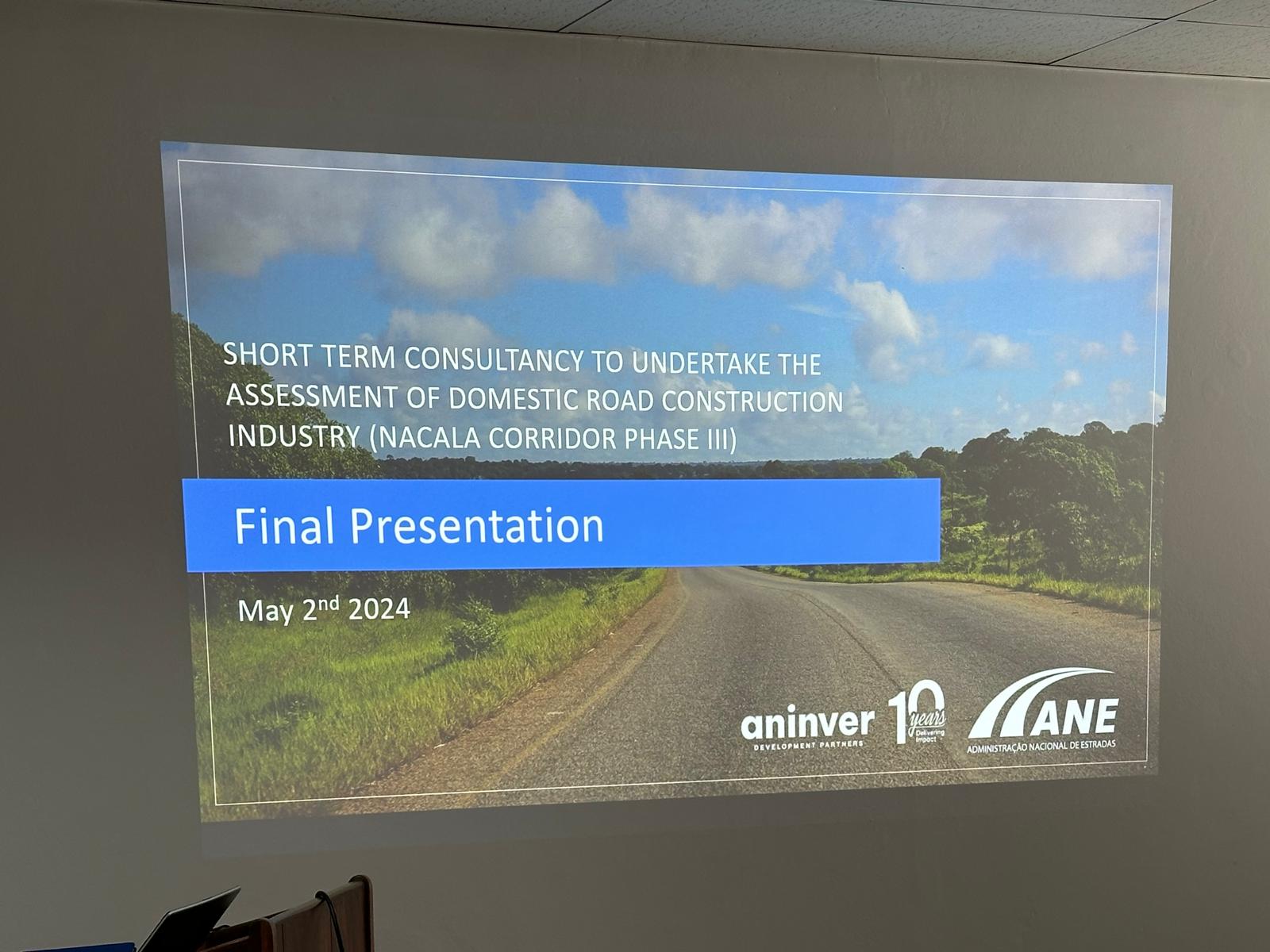Aninver delivers final presentation on Mozambique Construction Assessment
Aninver Development Partners successfully delivered the final presentation of their project “Assessment of Domestic Road Construction Industry” in Maputo, Mozambique, on May 2, 2024.

Aninver Development Partners successfully delivered on May 2th, 2024 the final presentation of the project “Assessment of Domestic Road Construction Industry” in Maputo. This marks the culmination of an extensive study funded by the African Development Fund (ADF) and commissioned by the National Roads Administration, IP (ANE IP).
Mozambique, a nation experiencing significant economic and social growth, is facing an increasing demand for robust infrastructure. The country’s road network, vital for economic development, has suffered from prolonged underfunding, resulting in substantial deterioration. To address this, the Republic of Mozambique initiated a comprehensive assessment to improve its domestic road construction industry, ensuring that local contractors can play a pivotal role in the country’s infrastructural development.
The project aimed to analyze the constraints faced by Mozambican contractors and propose viable solutions to enhance their participation in road construction projects. The study focused on identifying barriers preventing local contractors from entering the market, evaluating the regulatory framework, enhancing the capabilities of local contractors through training and resource allocation, and developing strategies for integrating them into large-scale road construction projects.
Presentation Highlights
The final presentation, held on May 2, 2024, in Maputo, brought together an array of stakeholders, including representatives from ANE IP, local contractors such as AGC Holdings Lda, FM Construções, and Global Construções, and members of the Mozambican Federation of Entrepreneurs (FME). Notably, the event also saw the participation of key funding and financing institutions like the African Development Fund (AfDB) and the Japan International Cooperation Agency (JICA), along with members of various government ministries.
The presentation commenced with a situational analysis, providing an overview of Mozambique’s construction industry, which highlighted the demand for road works and the challenges faced by local contractors. It delved into the regulatory insights, analyzing current regulations and their impact on local contractors, with recommendations for policy adjustments aimed at fostering a more inclusive environment.
A significant portion of the presentation was dedicated to capacity building, identifying skills gaps and training needs for local contractors, coupled with proposed training programs. The examination of financial barriers and recommendations for improving access to financial resources for local contractors was another key focus.
Main Findings and Recommendations
The study identified significant barriers such as stringent licensing requirements, limited access to financing, and a lack of advanced technical skills. To overcome these challenges, it recommended streamlining licensing processes, enhancing transparency in procurement, and enforcing preferential policies for local contractors.
In terms of capacity enhancement, the study proposed targeted training programs aimed at equipping local contractors with the necessary skills and knowledge to compete effectively in the road construction market. Financial solutions included suggestions for improving credit access, such as the establishment of credit facilities specifically designed for local contractors.
One of the key recommendations was to develop equipment-sharing programs and provide government subsidies for equipment acquisition. This would involve forming cooperatives or rental associations to pool resources. Additionally, improving the financial ecosystem for contractors by implementing Mobilization Advance Payments (MAP) and establishing credit guarantee schemes was emphasized. Enhancing financial education and advisory services for contractors was also suggested.
Strengthening contractor associations through promoting collaboration and partnerships, offering training and capacity-building programs, and facilitating access to microfinance and public-private partnership (PPP) opportunities was another significant recommendation. Addressing skill gaps by promoting internships, encouraging accreditation of vocational training institutions, and establishing a dedicated "Construction School" to provide specialized training were also proposed.
Feedback and Outcomes
The feedback from the attendees was overwhelmingly positive. Representatives from ANE IP, local contractors, and various stakeholders expressed their appreciation for the comprehensive nature of the study and the actionable recommendations provided. The proposed training programs and financial solutions were particularly well-received, with stakeholders eager to implement these initiatives to enhance the capacity and competitiveness of local contractors.
The final presentation in Maputo marked a significant milestone in Mozambique’s journey towards a more inclusive and robust road construction industry. Aninver Development Partners’ detailed analysis and practical recommendations provide a clear roadmap for empowering local contractors, ensuring that they can contribute effectively to the country’s infrastructural development.
